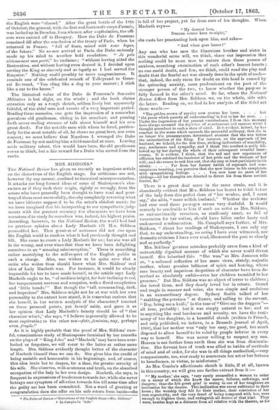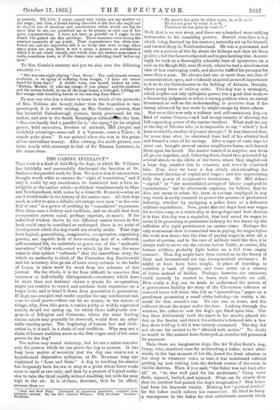MRS. SIDDONS.*
THE National Review has given us recently an ingenious article on the distortions of the English stage. Its criticisms are not, however (by any means), confined to theatrical misrepresentation. It attacks our long formed ideas of some of Shakespeare's cha- racters as if they took their origin, rightly or wrongly, from the actors who have generally been thought to have read and pour- trayed them most successfully, thereby completely reversing what we have hitherto supposed to be the actor's chiefest merit; for we have imagined that his interpreting to our sympathetic judg- ments with the greatest accuracy the characters we have been accustomed to study for ourselves was, indeed, his highest praise. According, however, to the National Review, the world had had no previous opinion about Lady Macbeth till Mrs. Siddons personified her. That greatest of actresses did not rise upon the English world to confirm what it had previously thought and felt. She came to create a Lady Macbeth for us ; but she was all in the wrong, and ever since that time we have been delighting ourselves in an " amazing misconception." There is something rather mortifying to the self-respect of the English public in such a charge. Also, one wishes to be quite sure that a critic who writes thus should know what Mrs. Siddons' real idea of Lady Macbeth was. For instance, it would be clearly impossible for her to have made herself, as the article says Lady Macbeth ought to be, " of medium height, her hair inclining to red, her temperament nervous and sanguine, with a florid complexion and ' little hands.'" But though the "tall, commanding, dark, and imperious" Mrs. Siddous might not be at war with her own personality to the extent here stated, it is somewhat curious that she herself, in her written analysis of the character,f touched on these personal points, put herself aside, and gave it as her opinion that Lady Macbeth's beauty should be of " that character which," she says, "I believe is generally allowed to be most otiptivatins to the other sex—fair, feminine, nay, perhaps even fragile."
As it is highly probable that the proof of Mrs. Siddons' care- ful, conscientious study of Shakespeare furnished by her remarks on the plays of " King John" and "Macbeth" may have been over- looked or forgotten, we will recur to the latter at rather more length. Mrs. Siddons evidently thought better of the character of Macbeth himself than we can do. She gives him the credit of being amiable and honourable in his beginnings, and, of course, this idea leads her to deepen, for a time, the greater atrocity of his wife. She observes, with acuteness and truth, on the absorbed occupation of the lady iu her own design. Macbeth, she says, is frequent in expressions of tenderness towards her, while she never betrays one symptom of affection towards him till some time after the guilty act has been committed. Not a word of greeting or congratulation does she offer on his safe return from battle—she
• The National Revitto—"Distortions of the English Stage—Mrs. Siddons." In CsunpbeTs "Life."
is full of her project, yet far from sure of his thoughts. When
Macbeth says— "My dearest love,
Duncan comes here to-night,"
she casts her penetrating look upon him, and asks— "And when goes hence ?"
Any one who has seen the illustrious brother and sister in this wonderful scene will, we think, share our impression that nothing could be more true to -nature than those pauses or anxious, searching examination of each other's inmost hearts ;. no one could doubt, and few, we think, could read the play and doubt that the fearful act was already done in the spirit of each— that, indeed, the only room for doubt on this head is caused by the quivering anxiety, most predominant on the part of the- stronger person of the two, to know whether the purpase is• fully formed in the other's mind. So far, where the National' Review differs from Mrs. Siddons, we, on the whole, side with the latter. Reading on, we find in her analysis of the third act these words: "The golden crown of royalty now crowns her brow. . . . but the peace which passeth all understanding' is lost to her fur ever. . Under the impression of her present wretchedness, I from this moment. have always assumed the dejection of countenance and manner which I thought accordant to such a state of mind. It is evident, indeed, by her conduct in the scene which succeeds the mournful soliloquy, that she is no longer the presumptuous, determined creature that she was before- the assassination of the King. For instance, on the approach of her- husband, we behold, for the first time, striking indications of sensibility, nay,. tenderness and sympathy, and I think this conduct is nobly fol- lowed up by her during the whole of their subsequent eventful inter- course. It is evident, I think, that the sad and new experience of affliction has subdued the insolence of her pride and the violence of her ; and she comes to seek him out, that she may at least participate in his misery. . . . Far from her former habits of reproach and con- temptuous taunting, you perceive that she now listens to his complaints.
with sympathizing feelings. . . You now bear no more of her chidings—all her thoughts are directed to divert his from these sorriest fancies, &c."
There is a great deal more in the same strain, and it is- abundantly evident that Mrs. Siddons has learnt to think better of the lady from this period than of "her weaker, and, I must say," she adds, "more selfish husband." Whether the reviewer had ever read these passages seems very doubtful. It would scarcely be creditable to him if such an artist as Mrs. Siddons, so extraordinarily veracious, so studiously exact, so full of veneration for her author, should have fallen under hasty and undeserved condemnation. Mr. Campbell says further, of Mrs. Siddons, " About her readings of Shakespeare, I can only say that, to my understanding, no acting I have ever witnessed, nor dramatic criticism I have ever read, illustrated the poet so closely
and so perfectly."
Mrs. Siddons' greatest mistakes probably arose from a kind of
untractably dignified manner of which she never could divest herself. She inherited this. "She was," as Mrs. Jameson tells us, " a softened reflection of her more stern, stately, majestic mother, whose genuine loftiness of spirit and beating, whose rare beauty -and imperious despotism of character have been de- scribed as absolutely awful—even her children trembled in her presence." But Mrs. Siddons was no object of terror to children ; she loved them, and they dearly loved her in return. Grand and tragic in manner and voice, she was simple and credulous in an extraordinary degree. Sydney Smith talked of her " stabbing the potatoes " at dinner, and calling to the servant, " Boy, bang me a knife," in the tone of " Give me the daggers "- all true, probably ; but it was simply natural to her, and as. to anything like real harshness and severity, we have the testi- mony of her daughter, in a beautiful sketch (written in French= and only published, we believe, in a Brussels journal of April,, 1860), that her mother was "only too easy, too good, too much disposed to allow herself to be ruled by people inferior in every way to herself. She was never willing to suspect any one. Heaven is not further from earth than she was from dissimula- tion. Her fervent love of truth was allied to habits of rectitude of mind and of order, for she was in all things methodical,—very compassionate, too, ever ready to consecrate her art or her fortune to beneficence, to virtue, to misfortune."
As Mrs. Combe's affectionate sketch is little, if at all, known in this country, we will give one further extract from it :—
" My mother,' abe says, very rarely counselled a woman to enter on a career of which she knew the snares, failures, sufferings, and dangers ; thus she felt great grief in seeing in one of her daughters an inclination for the theatre. This inclination was never cultivated in their home ; the worship they felt for their mother, their conviction of her rare superiority, and the very dread of being compared with her, were enough to frighten them, and extinguish all desires of that kind. They were, besides kept at a distance from all relation with the theatre, as far as possible. Till 1809, I never, except very rarely, saw my mother on the stage ; but then, a friend having observed to her that she ought not to deprive me of emotions and recollections which would one day be most dear to me, she permitted me to be present at each one of her great representations. I have not been as grateful as I ought to the friend who gained me this privilege. Those moments were among the sweetest momenta of my youth. Their remembrance has often com- forted me, and the impression left is so lively that even to-day, when many years are past, there is not a scene, a gesture, an exclamation which I do not recall exactly, and which does not awaken sometimes a smile, sometimes tears, as if the drama was unfolding itself before my eyes."
To Mrs. Combo's memory and pen we also owe the following anecdote :-
" She was one night playing Jane Shore.' The unfortunate woman exclaims, in an agony of suffering from hunger, ' I have not tasted bread for three days !' A child's voice was heard, broken by sobs, `Madam, Madam, do take my orange, if you please,' and the audience and the actress beheld, in one of the stage-boxes, a little girl, holding out her orange with trembling hands to the starving Jane Shore."
To any one who has a desire to know in which of the portraits of Mrs. Siddons she herself, rather than the tragedian, is best pourtrayed, it is worth stating, as Mrs. Combe's opinion, that the beautiful Gainsborough picture, lately purchased for the nation, and now in the South Kensington collecticettis the best. " One can hardly find a parallel for it," she says. LL' for its original power, bold execution, freedom of attitude, and (bright and nnfaded) colouring—some call it a Veronese, some a Titian ; it stands quite alone." It was painted when she was in the prime of her marvellous beauty. After viewing this noble picture, one turns nearly with contempt to that of Sir Thomas Lawrence, in the same room.































 Previous page
Previous page